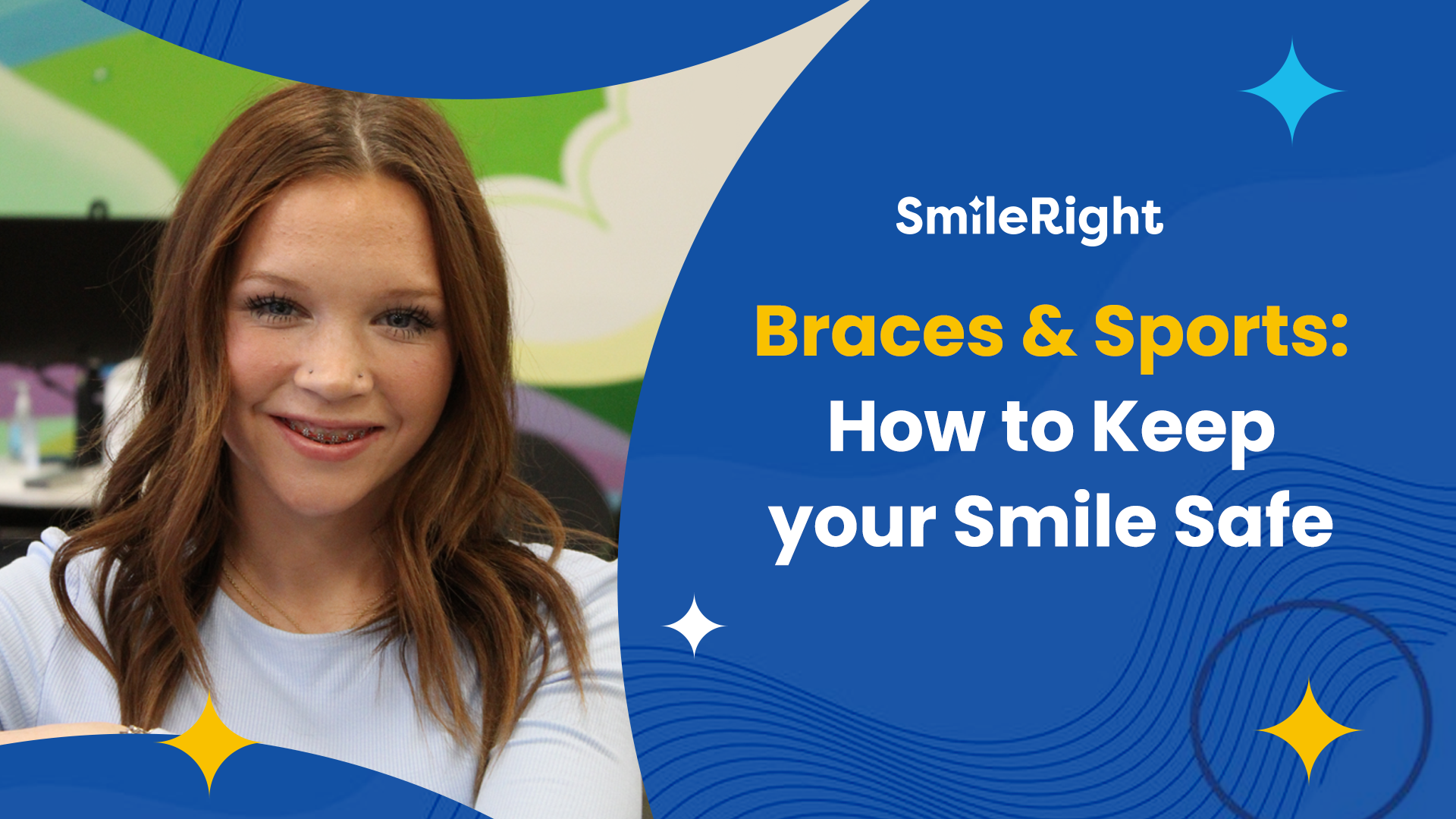Best Orthodontist In Houston, TX
Our Houston Orthodontic Blog


Sports are a fantastic way to stay active, have fun, and build confidence, but if you wear braces, there are some additional considerations to keep your smile safe while playing. Whether you’re hitting the basketball court, cycling down the street, or kicking a soccer ball, the risk of injury to your mouth and braces is real. However, with a few precautions, you can protect your braces and your smile without sacrificing your love for sports. In this blog post, we’ll discuss the best strategies to keep your braces safe during sports activities, including the importance of protective gear, specific tips for different types of sports, and how to care for your braces after an injury. 1. Why Are Braces at Risk in Sports? Braces are designed to straighten teeth over time, and this requires gentle but constant pressure on your teeth. However, when playing sports, especially contact or high-impact activities, your mouth is more vulnerable to injury. A sudden impact to the face, a fall, or even a loose ball can cause damage to both your braces and your teeth, which can delay the treatment process or even cause long-term dental issues. Injuries like cuts to the lips and gums, broken brackets, or displaced wires can not only cause pain but also interfere with the progress of your orthodontic treatment. That’s why it’s essential to take extra precautions to protect your braces while engaging in sports. 2. Use the Right Protective Gear The most effective way to protect your braces during sports is by wearing the right protective gear. The most important item to invest in is a mouthguard. A mouthguard is a soft, cushioned device worn over your teeth to prevent direct impact during sports. Not only does it protect your teeth from injury, but it also helps protect your braces from damage caused by forceful impacts. Types of Mouthguards: - Stock Mouthguards: These are pre-formed and ready to use, but they may not offer the best fit. - Boil-and-Bite Mouthguards: These are softened in boiling water, then fitted to your teeth by biting down. They offer a more custom fit than stock mouthguards. - Custom-Fitted Mouthguards: The best option for braces wearers, these are made by a dentist or orthodontist to perfectly fit your teeth and braces. They provide the best protection and comfort, although they can be more expensive. Mouthguards should always be worn during contact sports such as football, basketball, hockey, and lacrosse, as well as any sport where there’s a risk of falling or injury, like skateboarding or cycling. They are equally important for non-contact sports, like volleyball, where an accidental elbow or ball to the face can still cause injury. Most mouthguards can be purchased at places like Academy, Walmart, or Dick's Sporting Goods! 3. Be Mindful of Specific Sports Different types of sports come with different risks for those with braces. Here are some tips for protecting your smile based on the sport you play. Contact Sports (Football, Basketball, Rugby, etc.): - Always wear a mouthguard designed for braces. These sports come with a higher risk of head-on collisions or accidental contact, and a mouthguard is essential. - Consider wearing additional protective gear like face masks or helmets with a built-in chin guard if your sport allows for it. - Avoid making contact with opponents using your mouth or face. Keep your head up and practice safe, controlled movements. Individual Sports (Tennis, Track, Gymnastics, etc.): - Even though individual sports are less likely to involve body-to-body contact, there’s still a risk of injury, especially if you fall or collide with equipment. A mouthguard is still a good idea. - In gymnastics or martial arts, a fall can put significant stress on your mouth and teeth. Always be cautious with your landings and movements. Cycling and Skateboarding: - Protect your smile by wearing a mouthguard and a helmet. A fall or collision with another rider or object could damage your braces or teeth. - In skateboarding or cycling, it’s especially important to maintain proper balance and body control to reduce the risk of falling. Water Sports (Swimming, Water Polo, etc.) - Water sports generally pose a lower risk of injury to braces, but if you’re playing an active water sport like water polo, you should still wear a mouthguard. - Be mindful of the chlorine in swimming pools, as it can sometimes cause discoloration or damage to braces if not cleaned properly. Be sure to rinse your mouth and braces after swimming. Keep Up with Your Orthodontic Appointments Regular visits to your orthodontist are key to ensuring your braces are functioning properly and that your smile remains on track. These appointments are an opportunity for your orthodontist to make adjustments, check for any damage, and ensure everything is healing properly. If you’re participating in sports while wearing braces, it’s especially important to inform your orthodontist of your activity level. They might recommend adjustments, such as switching to a different type of bracket, to minimize the risk of injury or discomfort while playing sports. Conclusion Braces don’t have to hold you back from enjoying sports, but it’s essential to take the right precautions to keep your smile safe. Wearing the appropriate protective gear, like a mouthguard, being mindful of the risks associated with specific sports, and following good orthodontic care practices will help you avoid unnecessary injuries while keeping your treatment on track. Remember, sports are about having fun and staying active. With these tips, you can protect your braces and continue enjoying the activities you love. Stay safe, and keep smiling!

Braces are a significant investment of time, effort, and money, designed to straighten your teeth and give you a perfect smile. Once the braces come off, it’s tempting to think that the hard work is done. However, there’s one more essential step in the process: wearing your retainer. Many people underestimate the importance of retainers or neglect to wear them as instructed. This can lead to the very issue braces were meant to fix: misaligned teeth. Wearing your retainer after braces is crucial for ensuring that your teeth stay in their new, improved positions. In this blog post, we’ll explore why it’s so important to wear your retainer after braces, and how it can contribute to the long-term success of your orthodontic treatment. 1. Teeth Have Memory Teeth, like many other parts of the body, have a memory. When they’ve been misaligned for years, the bone, gum tissue, and ligaments around them adapt to that position. When braces are applied, they slowly move the teeth into a more desirable alignment, but this doesn’t mean that the surrounding tissues have fully adapted to the new position immediately after braces are removed. The teeth are still susceptible to shifting back to their original positions due to their “memory.” This is where retainers come in. Retainers help hold the teeth in their new positions, allowing the surrounding tissues to fully adapt to the change. Wearing a retainer ensures that the teeth stay in place while the bone and soft tissues settle into their new configurations. Without retainers, the risk of your teeth shifting back to their previous positions is significantly higher. 2. Prevents Relapse One of the primary reasons for wearing a retainer after braces is to prevent relapse—the term used when teeth begin to shift back toward their original misaligned state. After your braces are removed, the teeth are still vulnerable for a period of time. This is why orthodontists usually recommend wearing your retainer for an extended period after treatment. In some cases, this might be full-time initially and then transition to just nighttime wear after several months or years. While it’s common to see some shifting in the first few months after braces are removed, the longer you wear your retainer as instructed, the less likely it is that you will experience relapse. Ignoring this crucial step can lead to frustrating and expensive consequences, potentially requiring you to undergo orthodontic treatment all over again. 3. Long-Term Success of Orthodontic Treatment The ultimate goal of orthodontic treatment is not just to straighten teeth but to maintain that new alignment for the long haul. Without proper retention, the teeth might not stay aligned, which means all the time spent in braces could be wasted. If you’ve invested years of wearing braces, it’s essential to protect that investment and preserve your new smile. Wearing your retainer consistently plays a critical role in securing the long-term success of your orthodontic journey. For most people, the retainer must be worn for several months or even years to ensure the teeth stay aligned. Skipping this vital step can lead to the relapse of misalignment, necessitating additional visits to the orthodontist and the potential for costly and time-consuming treatments. A retainer is a simple, inexpensive way to protect your orthodontic investment and ensure that the hard work is not undone. 4. The Risk of Tooth Movement Even after your teeth have moved into their ideal positions, the jawbone that supports the teeth is still remodeling. Bone density takes time to adjust to the new alignment. This means that teeth are constantly trying to move, and even slight pressure from daily activities like chewing, talking, or clenching your teeth can cause the teeth to shift out of place. By wearing your retainer, you’re essentially stabilizing your teeth in their new positions, giving the bone and soft tissues time to fully adapt. Without this step, there’s a chance that the teeth will gradually drift back to their previous position over time. For example, if you fail to wear your retainer after the initial months following braces, the teeth could begin to crowd again or move out of alignment. 5. Preventing Unnecessary Costs Orthodontic treatment is expensive, and many people invest a significant amount of money to achieve their desired smile. Neglecting to wear your retainer can result in the need for follow-up treatments or even another round of braces, which could cost thousands of dollars. By committing to wearing your retainer, you protect your financial investment and avoid the frustration and extra costs that come with having to redo your orthodontic work. Retainers are relatively inexpensive compared to the costs of braces, and they are a simple, effective solution to maintaining your beautiful smile. Skipping out on retainer use is, in many ways, like throwing away your investment in the long term. Taking the time to wear your retainer is a small price to pay to ensure your results last. 6. Boosting Your Confidence Finally, wearing a retainer helps to maintain the results of your orthodontic treatment, ensuring that your smile stays just as bright and straight as the day your braces came off. When you spend time and effort to straighten your teeth, it can significantly boost your confidence and improve your overall appearance. You may find that your self-esteem increases as you feel more comfortable showing off your smile. However, if you neglect to wear your retainer and your teeth shift back, you might find yourself feeling disappointed and frustrated. Wearing a retainer helps to preserve the confidence boost you gained from your orthodontic treatment and ensures that you can continue to enjoy a beautiful, straight smile for years to come. Conclusion Wearing your retainer after braces is not just a formality—it is an essential part of the process of maintaining a straight, beautiful smile. Teeth have a tendency to shift back to their original positions, and without retention, all of the time and effort spent on braces could be wasted. It’s critical that you follow your orthodontist’s instructions and wear your retainer as prescribed. In the long run, wearing a retainer will save you from unnecessary expenses, prevent the frustration of tooth movement, and ensure the lasting success of your orthodontic treatment. So, if you’ve recently finished with braces, take the extra step to keep your teeth in place. Your smile—and your investment—will thank you for it!




